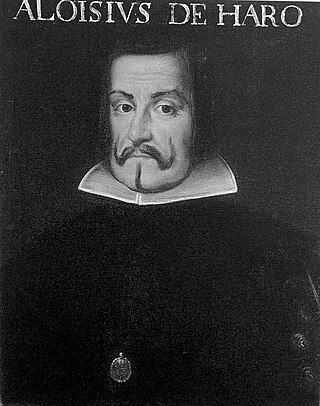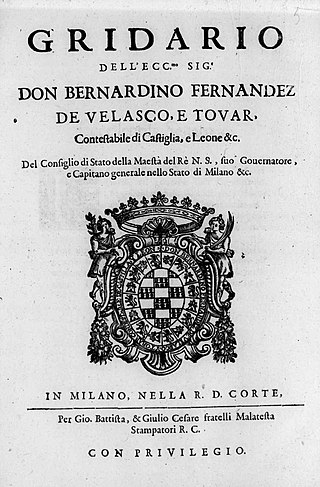Related Research Articles

Duke of Osuna is a Spanish noble title that was first awarded in 1562 by King Philip II of Spain to Pedro Girón de la Cueva,. Pedro was also Viceroy of Naples, (1582–1586), Ambassador in Portugal and 5th Count of Ureña.

Luis Méndez de Haro, 6th Marquis of Carpio or Luis Méndez de Haro y Guzmán, Grandee of Spain, , was a Spanish nobleman, political figure and general.

Bernardino Fernández de Velasco, 6th Duke of Frias, Grandee of Spain,, was a Spanish nobleman and diplomat.
The Sicilian title Duke of Bivona stems from the middle 16th century. Bivona is in Sicily, which had been conquered by Peter III of Aragon in 1282. It was given to people related to the powerful medieval Aragonese family of Luna, Zaragoza.

Pedro Antonio de Aragón was a Spanish nobleman, military figure and politician who served under Kings Philip IV and Charles II of Spain. He was the brother of Cardinal Pascual de Aragón, Viceroy of Naples, 1664–1666 and the son of Enrique Ramón Folch de Cardona y Córdoba and Catalina Fernández de Córdoba y Figueroa.

Pedro III Fajardo de Zúñiga y Requesens was a Spanish soldier and aristocrat notable for his command of Spanish forces during the Catalan Revolt after 1640. He was Viceroy of Valencia, 1631–1635, Viceroy of Navarre, 1638–1640, Viceroy of Catalonia, 1640–1642, Spanish Ambassador to Rome, and Viceroy of Sicily, 1644–1647.

Juan Tomás Enríquez de Cabrera y Ponce de Leon, VII Duque de Medina de Río-Seco, was a Spanish noble and military leader.
Fernando Ramon Folch De Cardona, 2nd Duke of Cardona,, was a Spanish noble. He became 2nd Duke of Cardona in 1513 and was also Viceroy of Sicily.
Francisco IV de Benavides y Dávila,, Viceroy of Sicily, 1678–1687, Viceroy of Naples, 1687–1696, 9th Count of Santisteban del Puerto since March 1666, was the second son of Diego de Benavides, 8th Count of Santisteban (1607–1666).
John Ramon III Folch de Cardona i de Prades,, was a Catalan nobleman. John Ramon's titles included Count of Prades (5th), Count of Cardona, Viscount of Vilamur, Baron of Entença, Admiral of Aragon, Captain general of Catalonia as well as Viceroy of Sicily from 1477 to 1479.

Enrique de Aragón Folc de Cardona y Córdoba, was 5th Duke of Segorbe, 6th Duke of Cardona and Viceroy of Catalonia.
Francisco Fernández de la Cueva y de la Cueva, 7th Duke of Alburquerque was a Spanish nobleman, military and politician.
The Spanish Royal Statute of 1834 established a bicameral legislature (Cortes) consisting of an upper chamber of unelected nobles and a lower chamber of elected representatives. The first session was opened on 24 July 1834 and closed on 29 May 1835.
References
- ↑ Bromley, J.S. (1970). The New Cambridge Modern History: Volume 6, The Rise of Great Britain and Russia, 1688–1715/25. p. 362. ISBN 9780521075244.